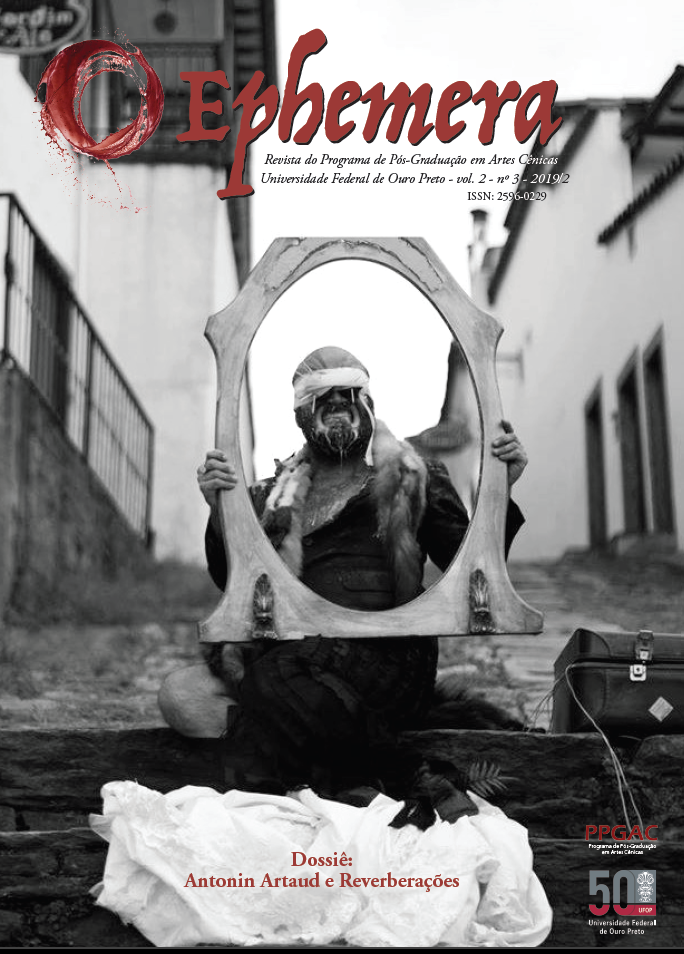Antonin Artaud e o grotesco
Resumo
A performatividade do grotesco – ou maneiras de performar grotescamente – não foram objeto de um estudo minucioso nem nos estudos gerais acerca do Grotesco nem nos estudos da Performance. Meu estudo de doutorado (em andamento) gira em torno de uma investigação através da prática de hibridez gestual e vocal e do excesso em performance. O hibridismo incompatível – onde duas ou mais coisas não se encaixam bem e contrastam – contribui para o grotesco, assim como o excesso. Neste artigo, eu testo a presença e a extensão do hibridismo e do excesso como qualidades constitutivas do grotesco na própria presença corporificada de Artaud, em sua teorização e na teatralidade de alguns de seus cenários e trabalhos realizados. Para Artaud, o grotesco é um corolário estético, e não um método sistemático.
Downloads
Referências
ADAMOV, A. Letter to Eric Sellin. Paris, October 31, 1964.
ARTAUD, Antonin. Collected Works. 26 Volumes. London: John Calder, 1974 and other years. (Shown as CW in this article)
ARTAUD, Antonin. Le théâtre de Séraphin. In The theatre and its double. Translated by M.C. Richards. New York: Grove, 1958.
ARTAUD, Antonin. Le théâtre et la science. L’Arbalete, Decines, vol. 13, Jul 1947.
ARTAUD, Antonin. The theatre and its double. Translated by M.C. Richards. New York: Grove, 1958. Shown as TD in this article.
ARTAUD, Antonin. Un athlétisme affectif. Le théatre et son double. Paris: Gallimard, 1964.
ARTAUD, Antonin. Oeuvres complètes. Paris: Gallimard. 1974 and other years. (Shown as OC in this article)
BARBER, Stephen. The screaming body. London: Creation Books, 1994.
BÉHAR, Henri. Étude sur le théâtre dada et surréaliste. Paris: Gallimard, 1967.
BÉHAR, Henri. Roger Vitrac: Un Réprouvé du surréalisme. Paris: Nizet, 1966.
CARDULLO, Bert & KNOPF, Robert, Eds. French Surrealism. Theater of the avant-garde, 1890-1950: A critical anthology. New Haven: Yale University, 2001. Available at www.jstor.org/stable/j.ctt1njm81.13. Accessed 8 Sept. 2019.
CONNON, Derek. In the Gutter, Looking at the Stars: Dualism in Vitrac's "Victor; ou, Les Enfants au pouvoir" The Modern Language Review, Vol. 89, No. 3 (Jul., 1994), pp. 595-605 Modern Humanities Research Association. Available at http://www.jstor.org/stable/3735118 . Accessed: 05 May. 2018.
CONTEMPORARY ARTS MEDIA. The Ugly Duckling. Directed by Lars Oyno. Artaud: How to teach Artaud, Disc 2, 2011. DVD.
HARPHAM, Geoffrey. On the grotesque: strategies of contradiction in art and literature. Princeton, New Jersey: Princeton University, 1982.
HORT, Jean. Antonin Artaud, le suicidé de la société. Geneva: Éditions Connaître, 1960.
JAKOBSON, Roman. Six lectures on sound and meaning. Translated by J. Mepham. Hassocks Eng.: Harvester, 1978.
JANNARONE, Kimberly. Artaud and his doubles. Ann Arbor: University of Michigan, 2012.
JENNINGS, Lee. The Ludicrous Demon: Aspects of The Grotesque in German Post-Romantic Prose. Berkeley: University of California, 1963.
KAYSER, Wolfgang. The Grotesque in Art and Literature. Translated by Ulrich Weisstein. Bloomington: University of Indiana, 1957.
KNOWLES, D. French drama of the inter-war years: 1918-1939. London: George G. Harrap, 1967.
KNOWLES, Ric. How theatre means. Basingstoke, Hampshire; New York, Palgrave Macmillan, 2014.
PLOCHER, Hanspeter. Der verlorene Vater: Roger Vitracs Victor ou Les enfants au pouvoir als Parodie des Eisten Surrealistischen Manifests. Romantistisches Jarbuch, No. 32, 1981. Available at DOI: https://doi.org/10.1515/9783110244892.117 . Accessed 8 Sept. 2019.
ROSE, Mark. The Actor and his Double: Antonin Artaud’s theory and practice of movement (France). Davis: University of California. ProQuest Dissertations Publishing, 1983. 8407934. Available at https://search-proquest-com.ezproxy.lib.monash.edu.au/docview/303131592?accountid=12528 . Accessed 8 Sept. 2019.
ROULEAU, Raymond. Letters from Raymond Rouleau to Anthony Swerling, (July 4th, 1967), in Swerling, A. Strindberg’s impact in France: 1920-1960. Cambridge: Trinity Lane Press, 1971.
SCHEER, Edward. 100 years of Cruelty: Essays on Artaud. Sydney: Power Publications and Artspace, 2000.
SELLIN, Eric. The dramatic concepts of Antonin Artaud. Chicago: University of Chicago, 1968.
STROWSKI, Fortunat. A Four-Act Tragedy in Ten Tableaux. Paris: Paris-Match, May 9, 1935.
THÉVENIN, Paula. Antonin Artaud: ce désespéré qui vous parle: essais. Paris: Seuil, 1993.
VIRMAUX, Alain. Antonin Artaud et le théâtre. Paris: Seghers, 1970.
WEISS, A. S. Libidinal Mannerisms and Profligate Abominations. 100 years of cruelty: essays on Artaud. Edited by Edward Scheer. Sydney: Power Institute: Centre for Art & Visual Culture, and Artspace, 2000.
WEISS, Allen. Radio, death, and the devil: Artaud’s Pour en finir avec le jugement de Dieu, Wireless imagination: sound, radio, and the avant-garde. Edited by Douglas Kahn and Gregory Whitehead. Cambridge, Mass.: MIT, 1992, pp. 269-307.
WEISS, Allen. The aesthetics of excess. Albany: State University of New York, 1989.
WHITEHEAD, G. The forensic theatre: memory plays for the post-mortem condition. Performing Arts Journal. vol.12, no. 2/3. New York: PAJ Publications, 1990. Available at https://www-jstor-org.ezproxy.lib.monash. edu.au/stable/3245556 . Accessed 8 Sept. 2019
WILES, Timothy. The theatre event: modern theories of performance. Chicago: University of Chicago, 1980.
Copyright (c) 2019 https://www.periodicos.ufop.br/pp/index.php/ephemera/information/sampleCopyrightWording

This work is licensed under a Creative Commons Attribution-NonCommercial-NoDerivatives 4.0 International License.
O/As autore/as mantêm os direitos autorais sobre os documentos publicados pelo periódico e cedem ao periódico o direito de publicação dos textos e de seus metadados (em múltiplos suportes e formatos), inclusão em bases de dados e assinatura de acordos de indexação atuais e futuros (mesmo com licenças menos restritivas, para os textos, ou sem restrições, para os metadados), de modo a garantir a indexação do documento publicado e de seus metadados.
O documento publicado será distribuído nos termos da Licença Creative Commons Atribuição - Não-Comercial 4.0 Internacional (CC-BY-NC) que permite o uso, a distribuição e reprodução em qualquer meio desde que sem fins comerciais e que o artigo, os autores e o periódico sejam devidamente citados.



